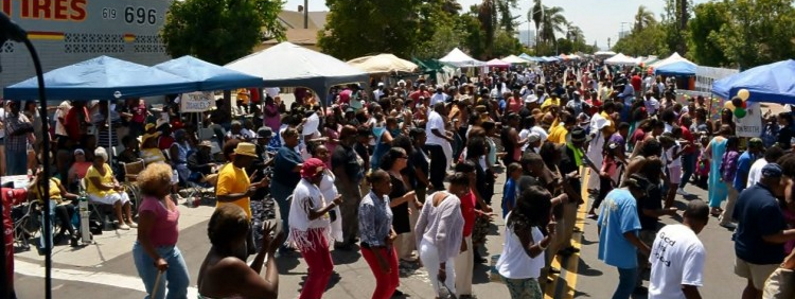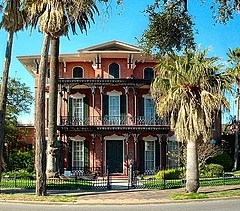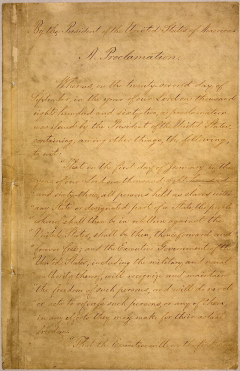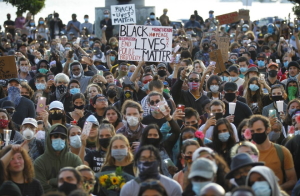|
Juneteenth, a holiday that commemorates the freeing of slaves in America, has been celebrated by Black Americans since news of emancipation reached the last slaves to be freed in Galveston, Texas in 1865. Despite the holiday's historic importance, it has never been widely recognized in the U.S. However, that appears to be changing, as calls to recognize Juneteenth on a larger scale have emerged against the backdrop of the murder of George Floyd. By Ian A. Lutz |

Cooper Family Juneteenth Celebration (photo NAACP San Diego)
On June 19, 1865, after the end of the American Civil War, Union Army troops arrived in Galveston, Texas, where Union Gen. Gordon Granger informed slaves in Texas that they had been freed from their owners.
155 years on, the commemoration of this historic day in American history is known as Juneteenth, a combination of the words that form the date—June and nineteenth. The holiday has also been known as Freedom Day, Jubilee Day and Liberation Day.
The significance of Juneteenth has remained under the radar of many Americans for generations. But in the face of recent protests over the death of George Floyd, calls to acknowledge and recognize the holiday on a wider scale are increasing.
Advocacy for Juneteenth’s recognition in recent days has come everywhere from internationally recognizable brands to local organizations that have celebrated Juneteenth for decades, including several here in San Diego, California.
With the nation at a boiling point over racial injustice and police brutality, now seems as good a time as ever to bring the history of Juneteenth to the forefront of Americans’ minds and to commemorate the day with education and celebration.

House in Galveston Where General
Order No. 3 Was Read |
A Brief History of JuneteenthJune 19 has been a day of celebration for Black Americans across the U.S. since news of emancipation reached slaves via Granger’s General Order No. 3 in Galveston, Texas in 1865. However, the celebration of Juneteenth does not coincide with recognition of the Emancipation Proclamation. |

Original Handwritten
Emancipation Proclamation
Emancipation Proclamation
According to juneteenth.com, the website for the National Registry of Juneteenth Organizations and Supporters, “The Emancipation Proclamation had little impact on [Texas-based slaveholders] due to the minimal number of Union troops [stationed in Texas] to enforce the new Executive Order.”
Juneteenth.com lists a number of other hypotheses as to why slaves in Texas learned of their freedom two-and-a-half years after the Emancipation Proclamation’s passing. These hypotheses range from the legend of a messenger who was murdered while on his way to Texas to report the news of emancipation to slaves, to a theory that slaveholders actively withheld the news who had received it in order to not impact their labor forces.
“Whatever the reasons,” the website states, “conditions in Texas remained status quo well beyond what was statutory.”
Black communities across the nation began celebrating Juneteenth in the years following Granger’s announcement in Galveston. However, for generations the holiday was unable to attract mainstream American attention, and it still has not gained recognition as a federal holiday, despite its overwhelming historic importance.
Because of the holiday’s lack of national recognition, Juneteenth celebrations across the U.S. are, traditionally, for the most part only celebrated in Black communities. However, in light of recent events, the possibility of Juneteenth being named a national holiday is growing more real by the day.
Tragedy and Resistance Spark Interest and Advocacy

San Diego Black Lives Matter Rally
(photo UT San Diego)
(photo UT San Diego)
On May 25, 2020, George Floyd, a resident of Minneapolis, Minnesota and a Black man, was murdered after being apprehended by a police officer, who knelt on Floyd’s neck to restrain him until he suffocated and died. Floyd’s unnecessary and tragic death has prompted an outpouring of calls for police reform and has renewed the momentum of the Black Lives Matter movement.
In the weeks since Floyd’s death, massive protests have occurred daily in cities across the U.S. and around the world. Here in San Diego, tens of thousands of overwhelmingly peaceful protesters have taken to the streets to speak out against Floyd’s death as well as continued police brutality against racial minorities.
Floyd’s death and the subsequent civil unrest—along with President Donald Trump scheduling his first campaign rally in over three months on June 19 and then rescheduling due to complaints'"have coincided in close proximity to the upcoming 155th anniversary of Juneteenth.
As a result, in recent days, a number of major U.S. corporations have begun declaring Juneteenth a company holiday to show sensitivity to the struggles experienced by Black Americans due to police violence and countless other forms of social injustice.
Companies that have announced their plans to recognize Juneteenth as a business holiday include Twitter, Nike, Target, J.C. Penny and U.S. Bank.
But while progress is being made with Juneteenth’s recognition at the corporate level, its omission as a federal holiday remains glaring. Also, three U.S. states—Hawaii, North Dakota and South Dakota —still do not recognize Juneteenth as a holiday in any capacity.
Cliff Robinson, the founder of the National Registry of Juneteenth Organizations and Supporters, said that, despite Juneteenth lacking designation as a federal holiday, the fact that influential private corporations have declared it a company holiday is “an amazing development.”
Robinson said he hadn’t thought before about companies such as Twitter and Nike having the power to take the lead on promoting the importance of Juneteenth. However, he is glad that those entities have the ability to reach large numbers of people and bring the holiday the attention it deserves.
“It’s something we would’ve hoped had happened a long time ago,” said Robinson regarding the recent uptick in interest surrounding Juneteenth.
Despite being disappointed that it has taken so long for the holiday to gain this level of attention, Robinson has been encouraged by the recent calls to recognize and commemorate Juneteenth, hoping this '"along with nationwide protests'"will be the beginning of lasting change.
“It shows a sign of acknowledgement, which is where the healing starts,” Robinson said of action taken by corporations to make Juneteenth a company holiday. “That’s a huge first step.”
Local Celebrations and Engagement

Cooper Family
Virtual Celebration
Virtual Celebration
Local and regional corporations based in San Diego are beginning to follow the lead of big-name companies who have announced plans to observe Juneteenth as a company holiday.
One local corporation that will commemorate Juneteenth this year is the Local 29 International Longshore and Warehouse Union. Local ILWU 29’s union members work at the Port of San Diego as well as a number of other ports in cities along the West Coast.
While some local organizations are just beginning the process of recognizing Juneteenth, others have been honoring and celebrating Juneteenth for years. San Diego-based organizations with close ties to Juneteenth include the Cooper Family Foundation, the North San Diego County NAACP and the WorldBeat Cultural Center.
The Cooper Family Foundation has one of the longest-standing traditions of celebrating Juneteenth in the greater San Diego area, going back more than 50 years. Other U.S. cities with rich histories of celebrating Juneteenth include Berkeley, California, Savannah, Georgia and Houston, Texas, the latter of which has celebrated the holiday since 1872 at Houston’s Emancipation Park.
Celebratory Juneteenth traditions include readings of the Emancipation Proclamation and literature by Black American authors, live music and dancing, as well as barbecuing.
The Cooper Family Foundation’s Juneteenth celebration occurs each year on the third Saturday of June, around the block of 30th Street and Imperial Avenue near downtown San Diego.
Lana Cooper-Jones is the daughter of the Cooper Family Foundation’s founder, Sidney Cooper. She helps oversee the Foundation’s operations and organizes events, including their annual Juneteenth celebration.
Cooper-Jones’ father was originally from Redbird, Oklahoma, a largely Black town that celebrated Juneteenth each year. Cooper-Jones said that when her father migrated to San Diego, he began organizing Juneteenth celebrations to commemorate the date’s importance for Black Americans and to express pride in his community.
“That was our Fourth of July,” said Cooper-Jones. “That was our time to celebrate.”
Cooper-Jones recalled her father hosting Juneteenth celebrations in a lot shared by the barbershop her father owned on Imperial Avenue. She also considered how much the Foundation’s gatherings have grown since their inception.
“My father died in 2001 but we carried it on and now it’s a street event,” Cooper-Jones said, noting the attendance of local community members, as well as live entertainment performers, local politicians and other community leaders and vendors who provide resources for the surrounding community.
According to Cooper-Jones, last year’s Cooper Family Foundation Juneteenth celebration drew 4,000 people to the area surrounding Imperial Avenue, where they still host the holiday’s festivities. Despite suggestions to move the event to other areas in San Diego County where it could draw bigger crowds, Cooper-Jones believes it has been important for these celebrations to remain where they started, saying, “We’re keeping it in our community.”
Based on last year’s turnout, Cooper-Jones was hoping for this year’s Juneteenth events to be even more well-attended. However, due to the COVID-19 pandemic, the Cooper Family Foundation will be unable to host an in-person celebration.
In lieu of an in-person gathering, Cooper-Jones said the Foundation will be broadcasting a private Juneteenth celebration from her family’s backyard on Facebook Live and Zoom this coming Saturday, June 20. However, she knows that it will not be the same.
“I can’t tell you how many people have called me who are sad that we aren’t able to have the celebration,” Cooper-Jones said.
One thing that will make up for the lack of an in-person Juneteenth celebration for Cooper-Jones'"and for those celebrating Juneteenth across the U.S.'"is the nation’s recent, increased interest in the holiday due to the ongoing protests.
“With what happened to George Floyd, people are waking up to the suffering of Black people,” Cooper-Jones said. “As Black people, we have suffered so much.”
As recent calls for racial equality, justice and fairness continue to ring out, change now feels possible, achievable. As part of that change, it is imperative that Juneteenth be widely acknowledged, appreciated and celebrated, in San Diego, in California and throughout the U.S. When you come down to it, in the vast expanse of U.S. History, is there any event more worth celebrating? We think not.









